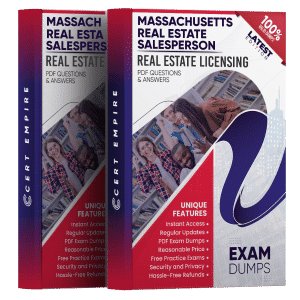Massachusetts Actual Estate Salesperson Real Exam Dumps [Jan 2026 Update]
Our Massachusetts Real Estate Salesperson study materials provide current, authentic Exam Dumps for the Massachusetts Real Estate Salesperson certification. Each question comes with verified answers, detailed explanations, and references for comprehensive understanding. With access to our online practice platform and sample questions, professionals rely on Cert Empire to prepare thoroughly and confidently for the Massachusetts Real Estate Salesperson exam.
What Users Are Saying:
Importance of Massachusetts Real Estate Salesperson Exam
The Massachusetts Real Estate Salesperson license has become a must-have for anyone looking to start or grow a career in property sales across the state. With the market showing constant demand for agents who understand both local rules and client needs, earning this license is often the first big step. The license itself is overseen by the Massachusetts Board of Registration of Real Estate Brokers and Salespersons, ensuring that only qualified individuals can serve clients. Many see it as a way to open the door to new opportunities, from working under established brokers to eventually leading their own firms.
How this License Shapes a Career
Getting licensed in Massachusetts shows both professionalism and commitment. It is especially valuable for individuals entering the real estate field for the first time, career changers, and those who wish to move from assistant roles into full sales responsibility. The state’s property market is competitive, so holding a license makes you stand out. Many people begin with this cert and then expand into higher roles, such as brokers, property managers, or specialists in commercial real estate.
Key Skills You Develop Along the Way
The training and preparation for the exam go far beyond simple memorization. You learn how contracts work, how financing is handled, and how to communicate ethically with clients. State-specific real estate laws in Massachusetts are also part of the preparation, so licensed agents know how to handle property transfers correctly. Negotiation, compliance, and problem-solving skills are all sharpened during this journey.
Why This License Improves Career Potential
A Massachusetts licensed salesperson typically sees higher earning capacity and more independence at work. The license also makes it easier to join respected brokerages or even move into property consulting. While exact numbers vary, many full-time agents in the state are earning salaries that are well above entry-level office jobs. In fact, a Massachusetts Real Estate Salesperson Exam Salary estimate shows consistent growth as more properties are bought and sold across the region.
Beginning with the Massachusetts Salesperson Exam
The Massachusetts Real Estate Salesperson Test is the gateway to working legally as an agent. It evaluates whether candidates are prepared to represent clients in buying and selling property, with questions that mix both state-specific and national real estate principles. Passing it is essential for getting the license issued.
Structure and Format of the Test
The exam is computer-based, consisting of multiple-choice questions. Candidates face a time limit, and they must score above a set passing mark to qualify. The Test is divided into two sections: the national part covering general property principles, and the Massachusetts-specific part focusing on local laws and regulations.
Breaking Down the Core Domains
Below is a simple table showing the major areas included in the exam:
|
Domain Area |
Focus Points |
|
Property Ownership and Transfer |
Titles, deeds, and ownership rules |
|
Land Use and Regulations |
Zoning, environmental laws, and planning |
|
Contracts and Agreements |
Key terms, validity, and contract enforcement |
|
Real Estate Finance |
Mortgages, loans, and lending practices |
|
Professional Responsibilities |
Ethics, disclosures, and client trust |
|
Massachusetts-Specific Content |
State rules, consumer protections, and local practices |
What the Syllabus Covers
The Massachusetts Real Estate Salesperson Exam Syllabus is designed to make sure you know both practical and theoretical aspects of the field. While the national part focuses on common principles, the state portion ensures that you are ready to deal with Massachusetts law.
How Difficult is the Test
For most candidates, the state portion is seen as slightly more challenging because it requires familiarity with Massachusetts-specific laws. Many find that time management during the exam is also a key hurdle. With proper preparation, though, passing is very possible.
Preparation That Gets Results
Good Exam Prep materials combine theory with Practice Questions. Candidates often start with official state guides and then move into mock exams. Doing practice work under timed conditions is especially useful, as it helps you manage pacing. Many test-takers also rely on a Question Bank to strengthen areas where they struggle most.
Opportunities That Open After Passing
Once you pass, you can register as a licensed salesperson and begin working under a broker. This is where practical experience begins. Over time, many salespeople advance to becoming brokers, opening new doors for higher pay and leadership roles.



Cassius Briar (verified owner) –
The Massachusetts Real Estate exam was a bit tricky, but the exam questions and study resources I used made it easier to pass. It was very clear and aligned with what I expected.
Mandy Torres (verified owner) –
The study guide highlighted key phrases effectively, helping me focus on essential points during quick reviews.